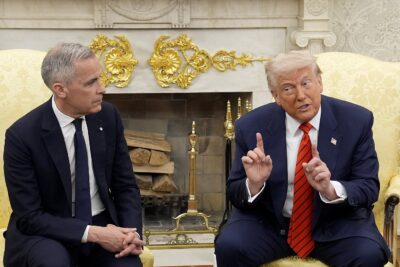Canada’s premiers to gather for meetings in Saskatchewan in June
By Canadian Press on May 7, 2025.

OTTAWA — Ontario Premier Doug Ford says Canada’s premiers and Prime Minister Mark Carney will meet in person in Saskatchewan on June 1 and 2.
Ford, who took part in a conference call with Carney and the other premiers Wednesday, said the premiers congratulated the prime minister on both his election victory and the “restraint” he showed during Tuesday’s meeting with U.S. President Donald Trump.
“I don’t think I’d have the restraint that he had yesterday, to be very frank,” Ford said. “I think it’s a good start on a new relationship… I think everyone’s feeling relatively good on the meeting yesterday. So that’s a good start.”
Carney spoke with the premiers Wednesday afternoon to brief them on his first meeting with Trump.
That briefing also came after Alberta Premier Danielle Smith publicly raised the spectre of her province separating from Canada.
Last week, Smith’s United Conservative government introduced legislation that, if passed, would sharply reduce the bar petitioners need to meet to trigger a provincial referendum.
Ford said Carney did “a really good job” of reaching out to the West and that he told the prime minister it’s time his government started “showing some love” to Saskatchewan and Alberta.
“The last prime minister showed no love,” Ford said. “So it’s nice that we’re heading out there to Saskatchewan for an FMM meeting.”
When asked about Premier Smith’s referendum legislation during a press conference in Washington on Tuesday, Carney said Canada is stronger when the provinces work together.
“As an Albertan, I firmly believe that,” he said. “You can always ask a question, but I know what I would respond clearly.”
On Tuesday, Ford criticized talk of Alberta separating and said Canada must be united in its fight against the United States.
“This is a time to unite the country, not people saying, ‘Oh, I’m leaving the country,'” Ford said.
Carney and Trump spent about two hours together Tuesday at the White House, including about half an hour in front of the cameras in the Oval Office.
It was their first face-to-face discussion of U.S.-Canada relations and Trump’s ongoing trade war.
Manitoba Premier Wab Kinew sent Carney a letter Wednesday pitching federal-provincial partnership on several “nation-building” projects.
They include creating a trade corridor through the Port of Churchill, establishing Indigenous “fair trade zones” and developing critical minerals infrastructure. In his letter, Kinew called his province “the Costco of critical minerals.”
Kinew said Manitoba “stands ready to collaborate” with the prime minister and other provinces and territories to “build a stronger Canada on projects of national interest.”
Carney and Trump appeared to emerge from the White House meeting pleased with how it had gone. Trump indicated he liked Carney and that there had been no tension during their talks.
Carney said that while he and Trump are now “fully engaged,” there’s “a lot more work to do.”
Carney said he and Trump agreed to talk further in the coming weeks and will meet in person again in June, when Carney hosts the G7 leaders at a summit in Alberta.
“Really, today marked the end of the beginning of a process of the United States and Canada redefining that relationship of working together,” Carney said.
“The question is how we will co-operate in the future. How we can build an economic and security relationship built on mutual respect, built on common interests, that delivers transformational benefits to our economies.”
Carney said he and Trump met as the leaders of “sovereign nations” and he told the president more than once that Canadians will never be interested in becoming Americans.
Fen Hampson, a Carleton University professor and co-chair of a group of experts on Canada-U.S. relations, said Carney has to manage a “two-track set” of negotiations with the U.S.
First, he faces coming negotiations on the Canada-U.S.-Mexico trade agreement. CUSMA is scheduled to be reviewed in 2026 but Trump has indicated he wants it reopened sooner.
Then there is the “more immediate” negotiating challenge of persuading Washington to lift recently imposed tariffs on Canadian exports, Hampson said.
“That’s the first order of the day because I think he recognizes, our government recognizes, that you can’t be renegotiating (a trade deal) when essentially the Americans have broken the back of the agreement with these very punitive tariffs,” he said.
Carney said Tuesday that with respect to re-establishing a constructive relationship with the U.S., he looks “forward, not back” and thinks he and Trump established a “good basis” to proceed.
While Trump said Tuesday there was nothing Carney could say to get him to lift the tariffs immediately, Hampson said the president is “quite capable” of changing his mind.
“We’ve seen that before in many cases,” he said. “We’ve even seen it with tariffs. He’s imposed tariffs and then lowered them or delayed them.”
Working in Canada’s favour, Hampson said, is the fact that the American economy is “about to tank” as a result of tariffs imposed on Canada and other countries, including China. The challenge will be to get Trump to understand the importance of Canada’s market, he added.
Carney is expected to name a new cabinet next week, ahead of the return of Parliament at the end of the month.
Hampson said he suspects the prime minister will be making some changes to his core team and that he’s going to have to pick people who are “tough and good negotiators.”
“As he looks to potential cabinet appointments, he really needs to look at them not just in terms of their management and ministerial skills, but in terms of their negotiating skills because they’re going to have to do some of the negotiating.”
– With files from Allison Jones in Toronto
This report by The Canadian Press was first published May 7, 2025.
Catherine Morrison, The Canadian Press
40-39


